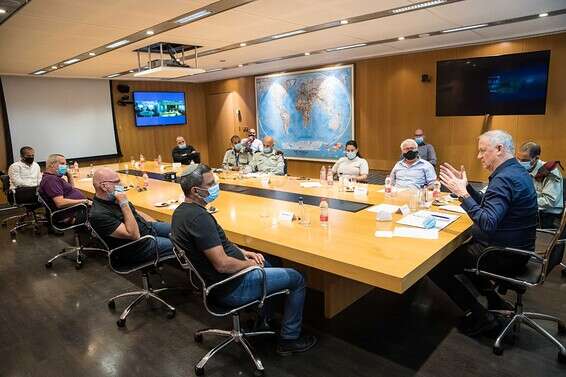Israel does suffer from internal crises - political instability, corona and the economic situation • But the terrorist organizations are wrong - all of Iran's branches must fear confrontation • Interpretation
Fires in the south
Photo:
Islands. Nose. times
Israel has entered another round of deterioration on the Gaza border. What began with the launching of incendiary and explosive balloons, led to rocket fire and harassment on the fence, terrorism that interferes with the lives of the residents of the envelope.
Israel is also in the midst of a potential political crisis, which could lead to a fourth round of elections. Among other things, the coalition is in dispute over the budget, the corona crisis is hitting the economy and unemployment rates are climbing to 20. The IDF hopes to begin implementing the new multi-year plan "Tnufa", which entails revolutionary changes in the power building, an implementation that is not possible without a stable government, a clear budget and budgetary priority for the IDF, which is not clear at this time.
Photo: Police Spokeswoman
The explosive balloons and rockets sent to Israel from the Gaza Strip found the IDF on alert, the prime minister and defense minister threatening to respond with force to any provocation, but Hamas does not seem deterred at this stage. Hamas seeks to take advantage of the political atmosphere in Israel and the desire to remain quiet, in order to push the government to continue coordination with Qatar and the flow of funding, not only until the end of 2020, but until the end of 2021, in exchange for a return to peace.
It is possible that Hamas' calculations make sense on his part. Israel's first priority remains Lebanon and Syria (Iran in the background), however it is not true and unlikely that the leadership in Israel will allow Hamas to continue to dictate the rules of the game this time as well. The leaders promised that provocations would be met with a harsh response, and the IDF, if challenged, knows how to respond decisively. It is important to create a new equation, according to which there is no difference between an incendiary balloon or an explosive balloon and a missile. It is clear and crucial to Hamas that the "pain / benefit" equation changes to its detriment.
Israel has deployed as a means of additional defense a tactical laser system for intercepting balloons. Many believe it is an overexertion, but in light of our recommendation it is no different from deploying an Iron Dome for rocket interception. In any case, lasers are not a sufficient answer. Turning balloon operators into legitimate targets is a way to re-establish deterrence and is no different from Israeli policy of harming activists who launch missiles. There is potential for escalation in this activity, but this risk must and must be taken.
Hezbollah under pressure
In the north the situation is more complex. Hezbollah, backed by Iran, was in the midst of a retaliatory effort thwarted by Israel. The explosion in Beirut added a complication to the equation and this puts the organization under further pressure.
Hezbollah's plans for Israel have not changed, even when protesting against it. The organization's leadership may be mistaken in believing that Israel will not respond to its provocation, revenge or promotion of the accurate missile program, due to the delicate situation in Lebanon, after the explosion. Like Hamas in Gaza, Hezbollah will be wrong here.
The Prime Minister and the Cabinet reiterated a long-standing policy in the north of zero tolerance for the presence of Iranian forces or their envoys on Syrian soil, for terrorist activities along the border and for attempts to transfer advanced weapons to Hezbollah in Lebanon via Syria or directly. The Reds will cross.
"Know how to harm not only buildings but also those who work from them"
Report: Israel could eliminate senior Hamas figures
Gantz on tensions in the south: "If it is not quiet in Sderot - it will not be in Gaza either"
Iran, which usually decides to attack Israel, is meanwhile cautiously awaiting the US election and the possibility of a democratic victory, which will affect the policy of "maximum pressure" that has worsened their economy, in addition to trouble as a result of the corona and the global crisis. Hezbollah's weapon for future confrontation with Israel. On the other hand, Hamas is a less important strategic asset that Iran can use. The IDF closely monitors the southern border, and from its point of view, all of Iran's envoys must fear confrontation.
Brigadier General (Res.) Professor Yaakov Nagel is a visiting professor in the Faculty of Aeronautics and Space at the Technion and a senior research fellow at the FDD (Foundation for Defense of Democracies). He served as Netanyahu's National Security Adviser and acting head of the National Security Council.
Dr. Jonathan Shenzer served as an expert on economic terrorism at the U.S. Treasury Department and currently serves as senior vice president of research at FDD.

